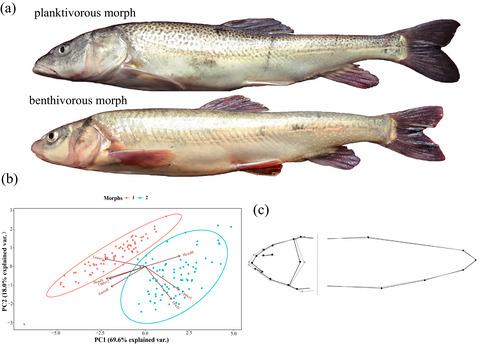当前位置:
X-MOL 学术
›
Ecol. Evol.
›
论文详情
Our official English website, www.x-mol.net, welcomes your
feedback! (Note: you will need to create a separate account there.)
Pelagic-benthic resource polymorphism in Schizopygopsis thermalis Herzenstein 1891 (Pisces, Cyprinidae) in a headwater lake in the Salween River system on the Tibetan Plateau.
Ecology and Evolution ( IF 2.3 ) Pub Date : 2020-07-08 , DOI: 10.1002/ece3.6470 Jialing Qiao 1 , Jiaxin Hu 2 , Qin Xia 1 , Ren Zhu 2 , Kang Chen 2 , Jie Zhao 2 , Yunzhi Yan 1 , Ling Chu 1 , Dekui He 2
Ecology and Evolution ( IF 2.3 ) Pub Date : 2020-07-08 , DOI: 10.1002/ece3.6470 Jialing Qiao 1 , Jiaxin Hu 2 , Qin Xia 1 , Ren Zhu 2 , Kang Chen 2 , Jie Zhao 2 , Yunzhi Yan 1 , Ling Chu 1 , Dekui He 2
Affiliation

|
Resource polymorphism is a ubiquitous phenomenon in vertebrates and may represent a critical intermediate stage in speciation. Freshwater lakes in high‐altitude areas represent a natural system for understanding resource polymorphism in fishes benefiting from diverse lacustrine environments and species‐poor fish assemblages. We report resource polymorphism in a cyprinid fish, Schizopygopsis thermalis , in Lake Amdo Tsonak Co, a headwater lake in the upper Salween River system. Two discrete intraspecific morphs, planktivorous and benthivorous, were identified according to geometric morphometrics and traditional univariate linear measures. The planktivorous morph exhibits a longer head, longer upper and lower jaw, larger asymptotic standard length (L∞ ), lower growth rate (k ), and higher growth performance index (φ ) than the benthivorous morph. With respect to descriptive traits, the planktivorous morph possesses a large, terminal mouth and obvious mucus pores on the cheek and chin, while the benthivorous morph is characterized by a more inferior mouth with a sharpen horny edge on the lower jaw and unconspicuous mucus pores. The discrete pelagic–benthic resources and low interspecific competition in the lake system might drive the initial differentiation of the two morphs, and partial spatial reproductive isolation in breeding further maintains and reinforces the differences between them.
中文翻译:

青藏高原萨尔温江水系源头湖泊Schizopygopsis Thermalis Herzenstein 1891(双鱼座,鲤科)中上层底栖资源多态性。
资源多态性是脊椎动物中普遍存在的现象,可能代表物种形成的关键中间阶段。高海拔地区的淡水湖泊代表了一个了解鱼类资源多态性的自然系统,受益于不同的湖泊环境和物种贫乏的鱼类组合。我们报告了萨尔温江上游水系的源头湖安多措纳错中鲤鱼( Schizopygopsis Thermalis)的资源多态性。根据几何形态测量学和传统的单变量线性测量,鉴定了两种离散的种内形态,食浮游生物和底栖动物。与底栖型相比,浮游食型具有更长的头部、更长的上颌和下颌、更大的渐近标准长度( L ∞ )、更低的生长速率( k )和更高的生长性能指数( φ )。从描述性特征来看,食浮游型的嘴大而末端,脸颊和下巴上有明显的粘液孔,而底栖型的特点是嘴部较差,下颌有尖锐的角质边缘,粘液孔不明显。湖泊系统中离散的中上层-底栖资源和低种间竞争可能推动了这两种形态的初步分化,而繁殖中的部分空间生殖隔离进一步维持和强化了它们之间的差异。
更新日期:2020-07-30
中文翻译:

青藏高原萨尔温江水系源头湖泊Schizopygopsis Thermalis Herzenstein 1891(双鱼座,鲤科)中上层底栖资源多态性。
资源多态性是脊椎动物中普遍存在的现象,可能代表物种形成的关键中间阶段。高海拔地区的淡水湖泊代表了一个了解鱼类资源多态性的自然系统,受益于不同的湖泊环境和物种贫乏的鱼类组合。我们报告了萨尔温江上游水系的源头湖安多措纳错中鲤鱼( Schizopygopsis Thermalis)的资源多态性。根据几何形态测量学和传统的单变量线性测量,鉴定了两种离散的种内形态,食浮游生物和底栖动物。与底栖型相比,浮游食型具有更长的头部、更长的上颌和下颌、更大的渐近标准长度( L ∞ )、更低的生长速率( k )和更高的生长性能指数( φ )。从描述性特征来看,食浮游型的嘴大而末端,脸颊和下巴上有明显的粘液孔,而底栖型的特点是嘴部较差,下颌有尖锐的角质边缘,粘液孔不明显。湖泊系统中离散的中上层-底栖资源和低种间竞争可能推动了这两种形态的初步分化,而繁殖中的部分空间生殖隔离进一步维持和强化了它们之间的差异。











































 京公网安备 11010802027423号
京公网安备 11010802027423号